JAVAEE——宜立方商城09:Activemq整合spring的应用场景、添加商品同步索引库、商品详情页面动态展示与使用缓存
1. 学习计划
1、Activemq整合spring的应用场景
2、添加商品同步索引库
3、商品详情页面动态展示
4、展示详情页面使用缓存
2. Activemq整合spring
2.1. 使用方法
第一步:引用相关的jar包。
- <dependency>
- <groupId>org.springframework</groupId>
- <artifactId>spring-jms</artifactId>
- </dependency>
- <dependency>
- <groupId>org.springframework</groupId>
- <artifactId>spring-context-support</artifactId>
- </dependency>
第二步:配置Activemq整合spring。配置ConnectionFactory
- <?xml version="1.0" encoding="UTF-8"?>
- <beans xmlns="http://www.springframework.org/schema/beans"
- xmlns:context="http://www.springframework.org/schema/context" xmlns:p="http://www.springframework.org/schema/p"
- xmlns:aop="http://www.springframework.org/schema/aop" xmlns:tx="http://www.springframework.org/schema/tx"
- xmlns:xsi="http://www.w3.org/2001/XMLSchema-instance"
- xsi:schemaLocation="http://www.springframework.org/schema/beans http://www.springframework.org/schema/beans/spring-beans-4.2.xsd
- http://www.springframework.org/schema/context http://www.springframework.org/schema/context/spring-context-4.2.xsd
- http://www.springframework.org/schema/aop http://www.springframework.org/schema/aop/spring-aop-4.2.xsd
- http://www.springframework.org/schema/tx http://www.springframework.org/schema/tx/spring-tx-4.2.xsd
- http://www.springframework.org/schema/util http://www.springframework.org/schema/util/spring-util-4.2.xsd">
- <!-- 真正可以产生Connection的ConnectionFactory,由对应的 JMS服务厂商提供 -->
- <bean id="targetConnectionFactory" class="org.apache.activemq.ActiveMQConnectionFactory">
- <property name="brokerURL" value="tcp://192.168.25.168:61616" />
- </bean>
- <!-- Spring用于管理真正的ConnectionFactory的ConnectionFactory -->
- <bean id="connectionFactory"
- class="org.springframework.jms.connection.SingleConnectionFactory">
- <!-- 目标ConnectionFactory对应真实的可以产生JMS Connection的ConnectionFactory -->
- <property name="targetConnectionFactory" ref="targetConnectionFactory" />
- </bean>
- </beans>
第三步:配置生产者。
使用JMSTemplate对象。发送消息。
第四步:在spring容器中配置Destination。
- <?xml version="1.0" encoding="UTF-8"?>
- <beans xmlns="http://www.springframework.org/schema/beans"
- xmlns:context="http://www.springframework.org/schema/context" xmlns:p="http://www.springframework.org/schema/p"
- xmlns:aop="http://www.springframework.org/schema/aop" xmlns:tx="http://www.springframework.org/schema/tx"
- xmlns:xsi="http://www.w3.org/2001/XMLSchema-instance"
- xsi:schemaLocation="http://www.springframework.org/schema/beans http://www.springframework.org/schema/beans/spring-beans-4.2.xsd
- http://www.springframework.org/schema/context http://www.springframework.org/schema/context/spring-context-4.2.xsd
- http://www.springframework.org/schema/aop http://www.springframework.org/schema/aop/spring-aop-4.2.xsd http://www.springframework.org/schema/tx http://www.springframework.org/schema/tx/spring-tx-4.2.xsd
- http://www.springframework.org/schema/util http://www.springframework.org/schema/util/spring-util-4.2.xsd">
- <!-- 真正可以产生Connection的ConnectionFactory,由对应的 JMS服务厂商提供 -->
- <bean id="targetConnectionFactory" class="org.apache.activemq.ActiveMQConnectionFactory">
- <property name="brokerURL" value="tcp://192.168.25.168:61616" />
- </bean>
- <!-- Spring用于管理真正的ConnectionFactory的ConnectionFactory -->
- <bean id="connectionFactory"
- class="org.springframework.jms.connection.SingleConnectionFactory">
- <!-- 目标ConnectionFactory对应真实的可以产生JMS Connection的ConnectionFactory -->
- <property name="targetConnectionFactory" ref="targetConnectionFactory" />
- </bean>
- <!-- 配置生产者 -->
- <!-- Spring提供的JMS工具类,它可以进行消息发送、接收等 -->
- <bean id="jmsTemplate" class="org.springframework.jms.core.JmsTemplate">
- <!-- 这个connectionFactory对应的是我们定义的Spring提供的那个ConnectionFactory对象 -->
- <property name="connectionFactory" ref="connectionFactory" />
- </bean>
- <!--这个是队列目的地,点对点的 -->
- <bean id="queueDestination" class="org.apache.activemq.command.ActiveMQQueue">
- <constructor-arg>
- <value>spring-queue</value>
- </constructor-arg>
- </bean>
- <!--这个是主题目的地,一对多的 -->
- <bean id="topicDestination" class="org.apache.activemq.command.ActiveMQTopic">
- <constructor-arg value="topic" />
- </bean>
- </beans>
第五步:代码测试
- @Test
- public void testSpringActiveMq() throws Exception {
- //初始化spring容器
- ApplicationContext applicationContext = new ClassPathXmlApplicationContext("classpath:spring/applicationContext-activemq.xml");
- //从spring容器中获得JmsTemplate对象
- JmsTemplate jmsTemplate = applicationContext.getBean(JmsTemplate.class);
- //从spring容器中取Destination对象
- Destination destination = (Destination) applicationContext.getBean("queueDestination");
- //使用JmsTemplate对象发送消息。
- jmsTemplate.send(destination, new MessageCreator() {
- @Override
- public Message createMessage(Session session) throws JMSException {
- //创建一个消息对象并返回
- TextMessage textMessage = session.createTextMessage("spring activemq queue message");
- return textMessage;
- }
- });
- }
2.2. 代码测试
2.2.1. 发送消息
第一步:初始化一个spring容器
第二步:从容器中获得JMSTemplate对象。
第三步:从容器中获得一个Destination对象
第四步:使用JMSTemplate对象发送消息,需要知道Destination
- @Test
- public void testQueueProducer() throws Exception {
- // 第一步:初始化一个spring容器
- ApplicationContext applicationContext = new ClassPathXmlApplicationContext("classpath:spring/applicationContext-activemq.xml");
- // 第二步:从容器中获得JMSTemplate对象。
- JmsTemplate jmsTemplate = applicationContext.getBean(JmsTemplate.class);
- // 第三步:从容器中获得一个Destination对象
- Queue queue = (Queue) applicationContext.getBean("queueDestination");
- // 第四步:使用JMSTemplate对象发送消息,需要知道Destination
- jmsTemplate.send(queue, new MessageCreator() {
- @Override
- public Message createMessage(Session session) throws JMSException {
- TextMessage textMessage = session.createTextMessage("spring activemq test");
- return textMessage;
- }
- });
- }
2.2.2. 接收消息
e3-search-Service中接收消息。
第一步:把Activemq相关的jar包添加到工程中
第二步:创建一个MessageListener的实现类。
- @Test
- public void testQueueProducer() throws Exception {
- // 第一步:初始化一个spring容器
- ApplicationContext applicationContext = new ClassPathXmlApplicationContext("classpath:spring/applicationContext-activemq.xml");
- // 第二步:从容器中获得JMSTemplate对象。
- JmsTemplate jmsTemplate = applicationContext.getBean(JmsTemplate.class);
- // 第三步:从容器中获得一个Destination对象
- Queue queue = (Queue) applicationContext.getBean("queueDestination");
- // 第四步:使用JMSTemplate对象发送消息,需要知道Destination
- jmsTemplate.send(queue, new MessageCreator() {
- @Override
- public Message createMessage(Session session) throws JMSException {
- TextMessage textMessage = session.createTextMessage("spring activemq test");
- return textMessage;
- }
- });
- }
第三步:配置spring和Activemq整合。
- <?xml version="1.0" encoding="UTF-8"?>
- <beans xmlns="http://www.springframework.org/schema/beans"
- xmlns:context="http://www.springframework.org/schema/context" xmlns:p="http://www.springframework.org/schema/p"
- xmlns:aop="http://www.springframework.org/schema/aop" xmlns:tx="http://www.springframework.org/schema/tx"
- xmlns:xsi="http://www.w3.org/2001/XMLSchema-instance"
- xsi:schemaLocation="http://www.springframework.org/schema/beans http://www.springframework.org/schema/beans/spring-beans-4.2.xsd
- http://www.springframework.org/schema/context http://www.springframework.org/schema/context/spring-context-4.2.xsd
- http://www.springframework.org/schema/aop http://www.springframework.org/schema/aop/spring-aop-4.2.xsd http://www.springframework.org/schema/tx http://www.springframework.org/schema/tx/spring-tx-4.2.xsd
- http://www.springframework.org/schema/util http://www.springframework.org/schema/util/spring-util-4.2.xsd">
- <!-- 真正可以产生Connection的ConnectionFactory,由对应的 JMS服务厂商提供 -->
- <bean id="targetConnectionFactory" class="org.apache.activemq.ActiveMQConnectionFactory">
- <property name="brokerURL" value="tcp://192.168.25.168:61616" />
- </bean>
- <!-- Spring用于管理真正的ConnectionFactory的ConnectionFactory -->
- <bean id="connectionFactory"
- class="org.springframework.jms.connection.SingleConnectionFactory">
- <!-- 目标ConnectionFactory对应真实的可以产生JMS Connection的ConnectionFactory -->
- <property name="targetConnectionFactory" ref="targetConnectionFactory" />
- </bean>
- <!--这个是队列目的地,点对点的 -->
- <bean id="queueDestination" class="org.apache.activemq.command.ActiveMQQueue">
- <constructor-arg>
- <value>spring-queue</value>
- </constructor-arg>
- </bean>
- <!--这个是主题目的地,一对多的 -->
- <bean id="topicDestination" class="org.apache.activemq.command.ActiveMQTopic">
- <constructor-arg value="topic" />
- </bean>
- <!-- 接收消息 -->
- <!-- 配置监听器 -->
- <bean id="myMessageListener" class="cn.e3mall.search.listener.MyMessageListener" />
- <!-- 消息监听容器 -->
- <bean class="org.springframework.jms.listener.DefaultMessageListenerContainer">
- <property name="connectionFactory" ref="connectionFactory" />
- <property name="destination" ref="queueDestination" />
- <property name="messageListener" ref="myMessageListener" />
- </bean>
- </beans>
第四步:测试代码。
- @Test
- public void testQueueConsumer() throws Exception {
- //初始化spring容器
- ApplicationContext applicationContext = new ClassPathXmlApplicationContext("classpath:spring/applicationContext-activemq.xml");
- //等待
- System.in.read();
- }
3. 添加商品同步索引库
3.1. Producer
e3-manager-server工程中发送消息。
当商品添加完成后发送一个TextMessage,包含一个商品id。

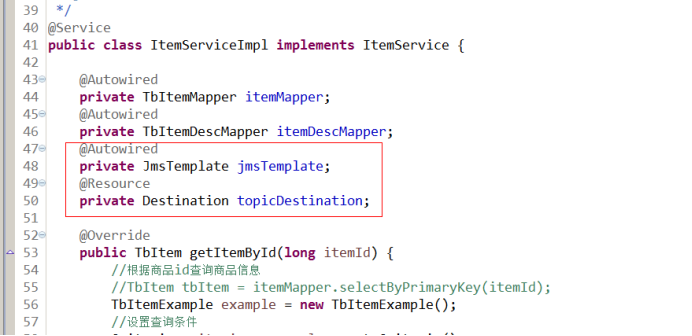
- @Override
- public e3Result addItem(TbItem item, String desc) {
- // 1、生成商品id
- final long itemId = IDUtils.genItemId();
- // 2、补全TbItem对象的属性
- item.setId(itemId);
- //商品状态,1-正常,2-下架,3-删除
- item.setStatus((byte) 1);
- Date date = new Date();
- item.setCreated(date);
- item.setUpdated(date);
- // 3、向商品表插入数据
- itemMapper.insert(item);
- // 4、创建一个TbItemDesc对象
- TbItemDesc itemDesc = new TbItemDesc();
- // 5、补全TbItemDesc的属性
- itemDesc.setItemId(itemId);
- itemDesc.setItemDesc(desc);
- itemDesc.setCreated(date);
- itemDesc.setUpdated(date);
- // 6、向商品描述表插入数据
- itemDescMapper.insert(itemDesc);
- //发送一个商品添加消息
- jmsTemplate.send(topicDestination, new MessageCreator() {
- @Override
- public Message createMessage(Session session) throws JMSException {
- TextMessage textMessage = session.createTextMessage(itemId + "");
- return textMessage;
- }
- });
- // 7、e3Result.ok()
- return e3Result.ok();
- }
3.2. Consumer
3.2.1. 功能分析
1、接收消息。需要创建MessageListener接口的实现类。
2、取消息,取商品id。
3、根据商品id查询数据库。
4、创建一SolrInputDocument对象。
5、使用SolrServer对象写入索引库。
6、返回成功,返回e3Result。
3.2.2. Dao层
根据商品id查询商品信息。

映射文件:
- <select id="getItemById" parameterType="long" resultType="cn.e3mall.common.pojo.SearchItem">
- SELECT
- a.id,
- a.title,
- a.sell_point,
- a.price,
- a.image,
- b. NAME category_name,
- c.item_desc
- FROM
- tb_item a
- JOIN tb_item_cat b ON a.cid = b.id
- JOIN tb_item_desc c ON a.id = c.item_id
- WHERE a.status = 1
- AND a.id=#{itemId}
- </select>
3.2.3. Service层
参数:商品ID
业务逻辑:
1、根据商品id查询商品信息。
2、创建一SolrInputDocument对象。
3、使用SolrServer对象写入索引库。
4、返回成功,返回e3Result。
返回值:e3Result
- public e3Result addDocument(long itemId) throws Exception {
- // 1、根据商品id查询商品信息。
- SearchItem searchItem = searchItemMapper.getItemById(itemId);
- // 2、创建一SolrInputDocument对象。
- SolrInputDocument document = new SolrInputDocument();
- // 3、使用SolrServer对象写入索引库。
- document.addField("id", searchItem.getId());
- document.addField("item_title", searchItem.getTitle());
- document.addField("item_sell_point", searchItem.getSell_point());
- document.addField("item_price", searchItem.getPrice());
- document.addField("item_image", searchItem.getImage());
- document.addField("item_category_name", searchItem.getCategory_name());
- document.addField("item_desc", searchItem.getItem_desc());
- // 5、向索引库中添加文档。
- solrServer.add(document);
- solrServer.commit();
- // 4、返回成功,返回e3Result。
- return e3Result.ok();
- }
3.2.4. Listener
- public class ItemChangeListener implements MessageListener {
- @Autowired
- private SearchItemServiceImpl searchItemServiceImpl;
- @Override
- public void onMessage(Message message) {
- try {
- TextMessage textMessage = null;
- Long itemId = null;
- //取商品id
- if (message instanceof TextMessage) {
- textMessage = (TextMessage) message;
- itemId = Long.parseLong(textMessage.getText());
- }
- //向索引库添加文档
- searchItemServiceImpl.addDocument(itemId);
- } catch (Exception e) {
- e.printStackTrace();
- }
- }
- }
3.2.5. Spring配置监听
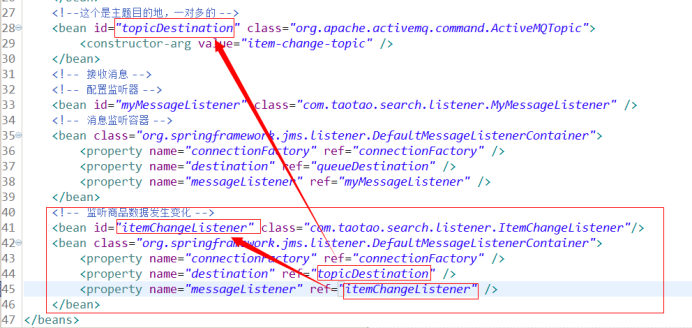
3.2.6. 实现流程
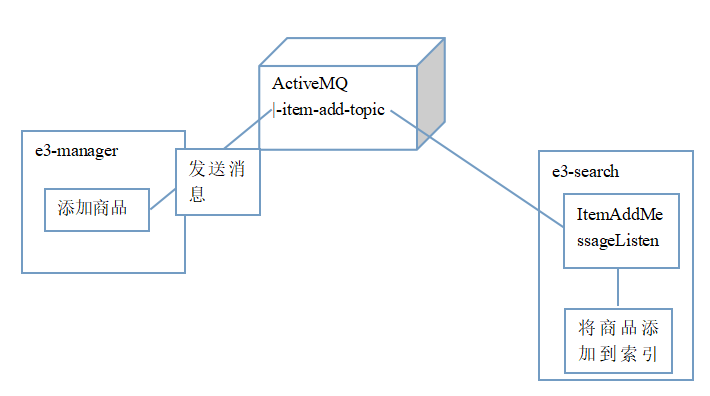
4. 商品详情页面展示
创建一个商品详情页面展示的工程。是一个表现层工程。
4.1. 工程搭建
e3-item-web。打包方式war。可以参考e3-portal-web
4.1.1. Pom文件
- <project xmlns="http://maven.apache.org/POM/4.0.0" xmlns:xsi="http://www.w3.org/2001/XMLSchema-instance"
- xsi:schemaLocation="http://maven.apache.org/POM/4.0.0 http://maven.apache.org/xsd/maven-4.0.0.xsd">
- <modelVersion>4.0.0</modelVersion>
- <parent>
- <groupId>cn.e3mall</groupId>
- <artifactId>e3-parent</artifactId>
- <version>0.0.1-SNAPSHOT</version>
- </parent>
- <groupId>cn.e3mall</groupId>
- <artifactId>e3-item-web</artifactId>
- <version>0.0.1-SNAPSHOT</version>
- <packaging>war</packaging>
- <dependencies>
- <dependency>
- <groupId>cn.e3mall</groupId>
- <artifactId>e3-manager-interface</artifactId>
- <version>0.0.1-SNAPSHOT</version>
- </dependency>
- <!-- Spring -->
- <dependency>
- <groupId>org.springframework</groupId>
- <artifactId>spring-context</artifactId>
- </dependency>
- <dependency>
- <groupId>org.springframework</groupId>
- <artifactId>spring-beans</artifactId>
- </dependency>
- <dependency>
- <groupId>org.springframework</groupId>
- <artifactId>spring-webmvc</artifactId>
- </dependency>
- <dependency>
- <groupId>org.springframework</groupId>
- <artifactId>spring-jdbc</artifactId>
- </dependency>
- <dependency>
- <groupId>org.springframework</groupId>
- <artifactId>spring-aspects</artifactId>
- </dependency>
- <dependency>
- <groupId>org.springframework</groupId>
- <artifactId>spring-jms</artifactId>
- </dependency>
- <dependency>
- <groupId>org.springframework</groupId>
- <artifactId>spring-context-support</artifactId>
- </dependency>
- <!-- JSP相关 -->
- <dependency>
- <groupId>jstl</groupId>
- <artifactId>jstl</artifactId>
- </dependency>
- <dependency>
- <groupId>javax.servlet</groupId>
- <artifactId>servlet-api</artifactId>
- <scope>provided</scope>
- </dependency>
- <dependency>
- <groupId>javax.servlet</groupId>
- <artifactId>jsp-api</artifactId>
- <scope>provided</scope>
- </dependency>
- <!-- dubbo相关 -->
- <dependency>
- <groupId>com.alibaba</groupId>
- <artifactId>dubbo</artifactId>
- <!-- 排除依赖 -->
- <exclusions>
- <exclusion>
- <groupId>org.springframework</groupId>
- <artifactId>spring</artifactId>
- </exclusion>
- <exclusion>
- <groupId>org.jboss.netty</groupId>
- <artifactId>netty</artifactId>
- </exclusion>
- </exclusions>
- </dependency>
- <dependency>
- <groupId>org.apache.zookeeper</groupId>
- <artifactId>zookeeper</artifactId>
- </dependency>
- <dependency>
- <groupId>com.github.sgroschupf</groupId>
- <artifactId>zkclient</artifactId>
- </dependency>
- <dependency>
- <groupId>junit</groupId>
- <artifactId>junit</artifactId>
- </dependency>
- </dependencies>
- <!-- 配置tomcat插件 -->
- <build>
- <plugins>
- <plugin>
- <groupId>org.apache.tomcat.maven</groupId>
- <artifactId>tomcat7-maven-plugin</artifactId>
- <configuration>
- <port>8086</port>
- <path>/</path>
- </configuration>
- </plugin>
- </plugins>
- </build>
- </project>
4.2. 功能分析
在搜索结果页面点击商品图片或者商品标题,展示商品详情页面。

请求的url:/item/{itemId}
参数:商品id
返回值:String 逻辑视图
业务逻辑:
1、从url中取参数,商品id
2、根据商品id查询商品信息(tb_item)得到一个TbItem对象,缺少images属性,可以创建一个pojo继承TbItem,添加一个getImages方法。在e3-item-web工程中。
- public class Item extends TbItem {
- public String[] getImages() {
- String image2 = this.getImage();
- if (image2 != null && !"".equals(image2)) {
- String[] strings = image2.split(",");
- return strings;
- }
- return null;
- }
- public Item() {
- }
- public Item(TbItem tbItem) {
- this.setBarcode(tbItem.getBarcode());
- this.setCid(tbItem.getCid());
- this.setCreated(tbItem.getCreated());
- this.setId(tbItem.getId());
- this.setImage(tbItem.getImage());
- this.setNum(tbItem.getNum());
- this.setPrice(tbItem.getPrice());
- this.setSellPoint(tbItem.getSellPoint());
- this.setStatus(tbItem.getStatus());
- this.setTitle(tbItem.getTitle());
- this.setUpdated(tbItem.getUpdated());
- }
- }
4、展示到页面。3、根据商品id查询商品描述。
4.3. Dao层
查询tb_item, tb_item_desc两个表,都是单表查询。可以使用逆向工程。
4.4. Service层
1、根据商品id查询商品信息
参数:商品id
返回值:TbItem
2、根据商品id查询商品描述
参数:商品id
返回值:TbItemDesc
- @Override
- public TbItemDesc getItemDescById(long itemId) {
- TbItemDesc itemDesc = itemDescMapper.selectByPrimaryKey(itemId);
- return itemDesc;
- }
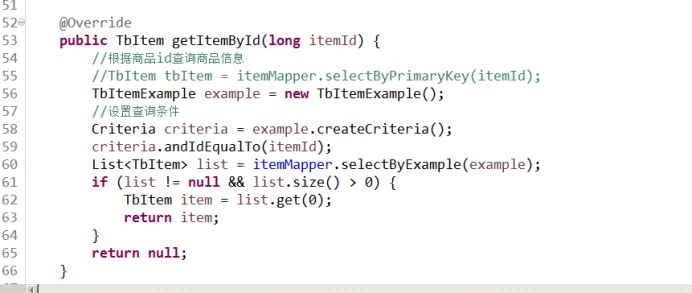
4.5. 表现层
4.5.1. Controller
请求的url:/item/{itemId}
参数:商品id
返回值:String 逻辑视图
- @Controller
- public class ItemController {
- @Autowired
- private ItemService itemService;
- @RequestMapping("/item/{itemId}")
- public String showItemInfo(@PathVariable Long itemId, Model model) {
- //跟据商品id查询商品信息
- TbItem tbItem = itemService.getItemById(itemId);
- //把TbItem转换成Item对象
- Item item = new Item(tbItem);
- //根据商品id查询商品描述
- TbItemDesc tbItemDesc = itemService.getItemDescById(itemId);
- //把数据传递给页面
- model.addAttribute("item", item);
- model.addAttribute("itemDesc", tbItemDesc);
- return "item";
- }
- }
4.6. 向业务逻辑中添加缓存
4.6.1. 缓存添加分析
使用redis做缓存。
业务逻辑:
1、根据商品id到缓存中查找
2、查到缓存,直接返回。
3、查不到,查询数据库
4、把数据放到缓存中
5、返回数据
缓存中缓存热点数据,提供缓存的使用率。需要设置缓存的有效期。一般是一天的时间,可以根据实际情况跳转。
需要使用String类型来保存商品数据。
可以加前缀方法对象redis中的key进行归类。
ITEM_INFO:123456:BASE
ITEM_INFO:123456:DESC
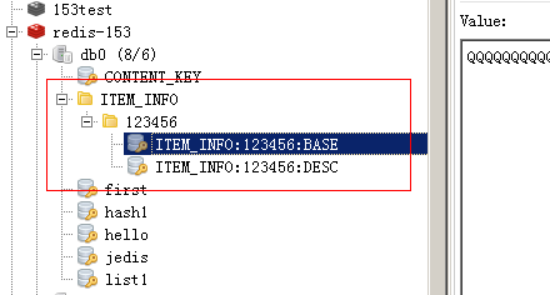
如果把二维表保存到redis中:
1、表名就是第一层
2、主键是第二层
3、字段名第三次
三层使用“:”分隔作为key,value就是字段中的内容。
4.6.2. 把redis相关的jar包添加到工程

4.6.3. 添加缓存
- @Override
- public TbItem getItemById(long itemId) {
- try {
- //查询缓存
- String json = jedisClient.get(ITEM_INFO_PRE + ":" + itemId + ":BASE");
- if (StringUtils.isNotBlank(json)) {
- //把json转换为java对象
- TbItem item = JsonUtils.jsonToPojo(json, TbItem.class);
- return item;
- }
- } catch (Exception e) {
- e.printStackTrace();
- }
- //根据商品id查询商品信息
- //TbItem tbItem = itemMapper.selectByPrimaryKey(itemId);
- TbItemExample example = new TbItemExample();
- //设置查询条件
- Criteria criteria = example.createCriteria();
- criteria.andIdEqualTo(itemId);
- List<TbItem> list = itemMapper.selectByExample(example);
- if (list != null && list.size() > 0) {
- TbItem item = list.get(0);
- try {
- //把数据保存到缓存
- jedisClient.set(ITEM_INFO_PRE + ":" + itemId + ":BASE", JsonUtils.objectToJson(item));
- //设置缓存的有效期
- jedisClient.expire(ITEM_INFO_PRE + ":" + itemId + ":BASE", ITEM_INFO_EXPIRE);
- } catch (Exception e) {
- e.printStackTrace();
- }
- return item;
- }
- return null;
- }
取商品描述添加缓存:
- @Override
- public TbItemDesc getItemDescById(long itemId) {
- try {
- String json = jedisClient.get(ITEM_INFO_PRE + ":" + itemId + ":DESC");
- //判断缓存是否命中
- if (StringUtils.isNotBlank(json) ) {
- //转换为java对象
- TbItemDesc itemDesc = JsonUtils.jsonToPojo(json, TbItemDesc.class);
- return itemDesc;
- }
- } catch (Exception e) {
- e.printStackTrace();
- }
- TbItemDesc itemDesc = itemDescMapper.selectByPrimaryKey(itemId);
- try {
- jedisClient.set(ITEM_INFO_PRE + ":" + itemId + ":DESC", JsonUtils.objectToJson(itemDesc));
- //设置过期时间
- jedisClient.expire(ITEM_INFO_PRE + ":" + itemId + ":DESC", ITEM_INFO_EXPIRE);
- } catch (Exception e) {
- e.printStackTrace();
- }
- return itemDesc;
- }
JAVAEE——宜立方商城09:Activemq整合spring的应用场景、添加商品同步索引库、商品详情页面动态展示与使用缓存的更多相关文章
- JAVAEE——宜立方商城07:Linux上搭建Solr服务、数据库导入索引库、搜索功能的实现
1. 学习计划 1.Solr服务搭建 2.Solrj使用测试 3.把数据库中的数据导入索引库 4.搜索功能的实现 2. Solr服务搭建 2.1. Solr的环境 Solr是java开发. 需要安装j ...
- JAVAEE——宜立方商城08:Zookeeper+SolrCloud集群搭建、搜索功能切换到集群版、Activemq消息队列搭建与使用
1. 学习计划 1.solr集群搭建 2.使用solrj管理solr集群 3.把搜索功能切换到集群版 4.添加商品同步索引库. a) Activemq b) 发送消息 c) 接收消息 2. 什么是So ...
- JAVAEE——宜立方商城01:电商行业的背景、商城系统架构、后台工程搭建、SSM框架整合
1. 学习计划 第一天: 1.电商行业的背景. 2.宜立方商城的系统架构 a) 功能介绍 b) 架构讲解 3.工程搭建-后台工程 a) 使用maven搭建工程 b) 使用maven的tomcat插件启 ...
- JAVAEE——宜立方商城02:服务中间件dubbo、工程改造为基于soa架构、商品列表实现
1. 学习计划 第二天:商品列表功能实现 1.服务中间件dubbo 2.工程改造为基于soa架构 3.商品列表查询功能实现. 2. 将工程改造为SOA架构 2.1. 分析 由于宜立方商城是基于soa的 ...
- JAVAEE——宜立方商城10:使用freemarker实现网页静态化、ActiveMq同步生成静态网页、Sso单点登录系统分析
1. 学习计划 1.使用freemarker实现网页静态化 2.ActiveMq同步生成静态网页 2. 网页静态化 可以使用Freemarker实现网页静态化. 2.1. 什么是freemarker ...
- JAVAEE——宜立方商城05:前台系统搭建、首页展示、Cms系统的实现
1. 学习计划 1.前台系统搭建 2.商城首页展示 3.Cms系统的实现 a) 内容分类管理 b) 内容管理 4.前台内容动态展示 2. 商城首页展示 系统架构: 页面位置: 2.1. 工程搭建 可以 ...
- JAVAEE——宜立方商城12:购物车实现、订单确认页面展示
1. 学习计划 第十二天: 1.购物车实现 2.订单确认页面展示 2. 购物车的实现 2.1. 功能分析 1.购物车是一个独立的表现层工程. 2.添加购物车不要求登录.可以指定购买商品的数量. 3.展 ...
- JAVAEE——宜立方商城06:Redis安装、数据类型和持久化方案、Redis集群分析与搭建、实现缓存和同步
1. 学习计划 1.首页轮播图展示 2.Redis服务器搭建 3.向业务逻辑中添加缓存. 4.使用redis做缓存 5.缓存同步. 2. 首页轮播图动态展示 2.1. 功能分析 根据分类id查询内容列 ...
- JAVAEE——宜立方商城11:sso登录注册功能实现、通过token获得用户信息、Ajax跨域请求(jsonp)
1. 学习计划 第十一天: 1.sso注册功能实现 2.sso登录功能实现 3.通过token获得用户信息 4.Ajax跨域请求(jsonp) 2. Sso系统工程搭建 需要创建一个sso服务工程,可 ...
随机推荐
- asp.net后台操作javascript:confirm返回值
在asp.net中使用confirm可以分为两种: 1.没有使用ajax,confirm会引起也面刷新 2.使用了ajax,不会刷新 A.没有使用ajax,可以用StringBuilder来完成. ( ...
- 基本控件文档-UITextField属性
CHENYILONG Blog 基本控件文档-UITextField属性 Fullscreen UITextField属性技术博客http://www.cnblogs.com/ChenYilong ...
- 【译】第九篇 SQL Server代理了解作业和安全
本篇文章是SQL Server代理系列的第九篇,详细内容请参考原文 在这一系列的上一篇,学习了如何在SQL Server代理作业步骤启动外部程序.你可以使用过时的ActiveX系统,运行批处理命令脚本 ...
- classList属性
1.传统方法: 在操作类名的时候,需要通过className属性添加.删除和替换类名.如下面例子: ? 1 <div class="bd user disabled"> ...
- [转]closed-form solution (闭合解/解析解)和数值解的理解
参考整理自:http://hi.baidu.com/cjb366/item/7290773b2d2eb9f2a9842873 closed-form solution :一般翻译为闭合解/解析解.这一 ...
- 20165230 《Java程序设计》实验三 敏捷开发与XP实践 实验报告
20165230 <Java程序设计>实验三 敏捷开发与XP实践 实验报告 一.实验报告封面 课程:Java程序设计 班级:1652班 姓名:田坤烨 学号:20165230 成绩: 指导教 ...
- 【navicat112_premium】navicat112_premium数据库连接工具安装过程
此工具及其方便,可以连接mysql.oracle.sqlserver登数据库... 1.下载安装包Navicat Premium_11.2.7简体中文版.rar 下载地址:http://qiaoliq ...
- linux nginx大量TIME_WAIT的解决办法--转
netstat -n | awk '/^tcp/ {++S[$NF]} END {for(a in S) print a, S[a]}' TIME_WAIT 8535 CLOSE_WAIT 5 FIN ...
- fc26 url
aarch64 http://linux.yz.yamagata-u.ac.jp/pub/linux/fedora-projects/fedora-secondary/releases/26/Ever ...
- aarch64_g4
golang-github-inconshreveable-muxado-devel-0-0.7.gitf693c7e.fc26.noarch.rpm 2017-02-11 16:47 30K fed ...
